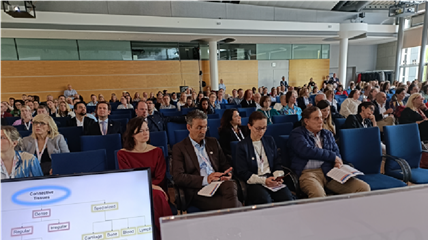Dr. Wright presented at the first World Congress on Lipedema, which was held in October 2023 in Potsdam, Germany. The common goal of this gathering was to share knowledge, experiences, and ideas related to the understanding and treatment of Lipedema and to benefit from first-hand, high-class education, network, and learn from world-renowned experts about the latest science and best practices in the management of lipedema.
The Lipedema World Congress is designed to bring together a broad spectrum of healthcare professionals, including lymphologists, plastic surgeons, angiologists, phlebologists, nutritionists, dermatologists, physical therapists, bariatric and Metabo specialists, and radiologists, as well as representatives of patient associates from around the world to share experiences and expertise on an international high-class level and to reflect on how to best incorporate these insights into education and clinical practice.
Dr. Wright gathered with peers from across the globe to learn the latest science and best practices in treating lipedema and shared his techniques and experiences treating patients. His presentation at the Lipedema World Congress was on how Lipedema Reduction Surgery Improves Mobility, Physical Function, and Multiple Measures of Quality of Life in Women with Lipedema.


Dr. Wright worked alongside close to 100 experts worldwide on an important project in the field of lipedema research and treatment in evaluating key statements for developing a position paper focusing on lipedema coordinated by the Lipedema World Alliance. The document aims to comprehensively cover various aspects of lipedema, including its nature, epidemiology, pathophysiology, diagnosis, and treatment approaches. The intention is to create a resource that assists healthcare professionals, researchers, funders, and individuals impacted by lipedema in understanding the current opinions of experts and gaps in knowledge and management of the condition. This position paper is the basis and starting point for further areas to be explored as they relate to lipedema. Given the evolving nature of lipedema research and the varying degrees of evidence available, reaching a unanimous consensus in certain areas might prove challenging. Acknowledging this, the project will employ a multi-step Delphi method to facilitate expert collaboration. This method will enable the group to iteratively evaluate and refine statements related to lipedema based on the current literature and collective expertise.